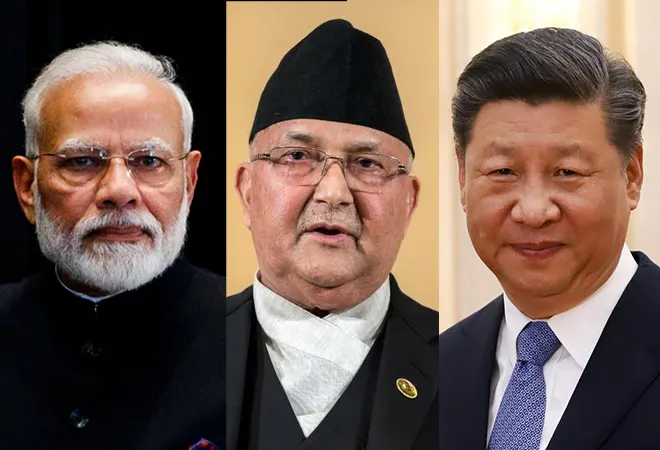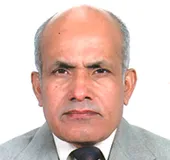-
CENTRES
Progammes & Centres
Location

The Indo-Chinese rivalry has intensified in Nepal with the K.P. Sharma Oli-led government of the Nepal Communist Party (NCP)—which has a nearly two-thirds majority in the House of Representatives—and the Nepalese parliament being gripped by political upheaval. At this critical moment, the ruling party is at the verge of a split due to the growing dissatisfaction among its political workers, the monarchical forces are raising their heads twelve long years after its collapse, the government has almost failed to control the COVID-19 pandemic and there is rampant corruption in different layers of the government. This is also the time when India is strongly trying to re-assert its traditional influence in the country; while Beijing is in no mood to be left behind.
Also, the Western powers led by the USA have become active with the offer of US grants valued at USD 500 million under the Millennium Challenge Corporation (MCC), which is awaiting approval from the Nepalese parliament. Many believe that the MCC grants under the Indo-Pacific framework are aimed at countering the Belt and Road Initiative (BRI) of China. Other World powers are engaged in religious conversions. Domestic factors have provided enough space for these foreign powers to play in the country.
In such a turbulent situation, India recently took the initiative to improve its relations with its Himalayan neighbour, which was derailed last year mainly on account of Limpiadhura-Kalapani-Lipulekh border issue. Towards this end, the higher-level visit of the Director of Research and Analysis Wing (R&AW), Samant Kumar Goel, to Nepal on October 21; followed by the visit of Indian Army chief, General MM Naravane, between November 4 and 6; and the visit of Indian Foreign Secretary, Harsh Vardhan Shringla’s on November 26 and 27 in quick succession within five weeks shows the interest that India has in diffusing the deadlock with Nepal.
At the end of his visit to Kathmandu, Foreign Secretary Shringla stated that India happens to be Nepal’s foremost friend and development partner. He also added that Indo-Nepal relations are based on the four pillars of development cooperation, stronger connectivity, expanded infrastructure and economic projects, apart from the common civilisation between the two countries. In his upbeat mood, he also added that India and Nepal were on the same page and share the same vision.
Immediately after the visits of the high dignitaries from India, some signs of improvement in Nepal-India relations are in offing. At least, the visits of the Indian authorities to Nepal is important as it opened channels of communication between the two countries that remained closed for quite some time.
Now, the two countries are likely to resume air service between Kathmandu and New Delhi on a limited scale. Nepal has now become positive on a travel air bubble with India. The two countries also agreed to resume the Pancheshwar multi-model project. Nepal’s Foreign Minister Pradeep Gyawali is set to visit New Delhi in December for his meeting with his Indian counterpart S. Jaishankar in his efforts to normalise the relations between the two countries. In Delhi, he is scheduled to chair a meeting of the India-Nepal Joint commission where consultations would be made between the officials of the two countries on issues related to trade and transit, apart from water resources. Over and above, nearly two dozen mechanisms working between Nepal and India that remained non-functional for over a year are likely to be resumed.
However, it appears that Nepal’s northern neighbour China was somewhat suspicious of the visits made by the Indian dignitaries in Nepal, though in certain quarters it was indicated that Nepal-China relations are not likely to impact any third country. Perhaps, this was the reason why just two days after the visit of Indian Foreign Secretary Shringla to Nepal, State Councilor and Defense Minister of China, Wei Fenghe, conducted a day-long stay in Kathmandu on November 29 before going to Pakistan.
It appears that Nepal’s northern neighbour China was somewhat suspicious of the visits made by the Indian dignitaries in Nepal, though in certain quarters it was indicated that Nepal-China relations are not likely to impact any third country
In the diplomatic circles, it is believed that China hastened to send its high-profile defence minister to Nepal in the hope that its equation with China is not influenced by the visit of top Indian officials. Beijing is concerned about the slow pace of implementation of projects under the Belt and Road Initiative (BRI) in Nepal. The two countries had signed the agreement on BRI in 2017 when Pushpa Kamal Dehal was the Prime Minister of the country. China is also concerned about the growing presence of the US in the South Asian region.
To promote its interests in Nepal, China is interested to see that unity is maintained in the ruling NCP, with whom the Communist Party of China has close relations. But recently Prime Minister Oli is learnt to have indicated to the Chinese that he could handle the internal party tussle on his own without any foreign support.
To promote its interests in Nepal, China is interested to see that unity is maintained in the ruling NCP, with whom the Communist Party of China has close relations
Not much is known about the outcome of Chinese Defence Minister Gen Wei Fenghe’s visit to Nepal, who had come to the country with a 20-member delegation. Yet, media reports confirm that his main objective was to strengthen the mutual military assistance between the two countries. Accordingly, he discussed issues like resuming joint military training and cooperation with Nepal, which conforms with China’s desire to consolidate its military partnership with the country. The visit could expedite the delivery of defence-related equipment to the Nepal army worth RMB 150 million.
Minister Wei Fenghe claimed that the relations between Nepal and China were strong, but that he still wanted to take it to a new height. He also assured Nepal of safeguarding its sovereignty, independence and territorial integrity. In return, Nepal expressed its commitment to the “One-China” policy. Besides, Nepal also assured that it would implement the agreements made with China.
At a time when Nepal’s relations with India are in the process of resetting, certain elements might not be happy with this development and they could try to spoil the achievements made so far. The two sides, therefore, need to be extra-cautious to see that such elements do not get any space in relations between the two countries. The growing tilt of the country towards one neighbour at the cost of the other is not desirable. In future, Nepal needs to exhibit greater statesmanship to maintain due balance in its foreign relations, especially with its neighbours – India and China – and keeping the superpower USA in good faith.
The views expressed above belong to the author(s). ORF research and analyses now available on Telegram! Click here to access our curated content — blogs, longforms and interviews.

Hari Bansh Jha was a Visiting Fellow at ORF. Formerly a professor of economics at Nepal's Tribhuvan University, Hari Bansh’s areas of interest include, Nepal-China-India strategic ...
Read More +